Renaissance Test (Days 106-121)
0.0(0)
Card Sorting
1/50
Earn XP
Description and Tags
5/5/23. These are googles answers so take this with a grain of salt
Last updated 1:08 PM on 5/5/23
Name | Mastery | Learn | Test | Matching | Spaced | Call with Kai |
|---|
No analytics yet
Send a link to your students to track their progress
51 Terms
1
New cards
vernacular
the language or dialect spoken by the ordinary people in a particular country or region
2
New cards
secular
things that have no religious or spiritual basis
3
New cards
Ad Fontes
* lit. “to the sources”
* renewed study of Greek and Latin classics in Renaissance humanism
* renewed study of Greek and Latin classics in Renaissance humanism
4
New cards
humanism
* prime importance to human rather than divine or supernatural matters
* Renaissance cultural movement which turned away from medieval scholasticism and revived interest in ancient Greek and Roman thought
* (landscape art)
* Renaissance cultural movement which turned away from medieval scholasticism and revived interest in ancient Greek and Roman thought
* (landscape art)
5
New cards
individualism
* self-awareness
* acknowledgment or even pride in being different/unique
* desire to be perceived as different (portrait art)
* acknowledgment or even pride in being different/unique
* desire to be perceived as different (portrait art)
6
New cards
renaissance
* literally means “rebirth”
* revival of art and literature under the influence of classical models in the 14th–16th centuries
* revival of art and literature under the influence of classical models in the 14th–16th centuries
7
New cards
patron
the person or group of people paying for the image (art)
8
New cards
utopia
* lit. “no place”
* an unattainable idea of a community that possessed clear attributes of perfection
* an unattainable idea of a community that possessed clear attributes of perfection
9
New cards
playwright
writers who specialize in telling stories for the stage
10
New cards
diet
formal assembly
11
New cards
papal bull
type of public decree, letters patent, or charter issued by a pope of the Catholic Church
12
New cards
Exsurge Domine
* papal bull
* (“Arise O Lord”)
* charged that 41 sentences in Luther's various writings were “heretical, scandalous, offensive to pious ears,” though it did not specify which sentences had received what verdict
* (“Arise O Lord”)
* charged that 41 sentences in Luther's various writings were “heretical, scandalous, offensive to pious ears,” though it did not specify which sentences had received what verdict
13
New cards
annul
declare (a marriage) to have had no legal existence
14
New cards
geocentrism
having or representing the earth as the center, as in former astronomical systems
15
New cards
heliocentrism
having or representing the sun as the center
16
New cards
rationalism
* opinions and actions should be based on reason and knowledge rather than on religious belief or emotional response
* reason rather than experience is the foundation of certainty in knowledge
* treating reason as the ultimate authority in religion
* reason rather than experience is the foundation of certainty in knowledge
* treating reason as the ultimate authority in religion
17
New cards
empiricism
theory that all knowledge is derived from sense-experience
18
New cards
anathema
formal curse by a pope or a council of the Church, excommunicating a person or denouncing a doctrine
19
New cards
renaissance art
gradual shift from the abstract forms of the medieval period to the representational forms of the 15th century. Subjects grew from mostly biblical scenes to include portraits, episodes from Classical religion, and events from contemporary life
20
New cards
renaissance worldview
* humanism-promoted the idea that humans are at the center of their own universe and should embrace human achievements in education, classical arts, literature and science
* individualism-thought it right to be themselves, think for themselves
* secularism-people started to see life on Earth as worth living for its own sake, not just as an ordeal to endure before going to heaven
* individualism-thought it right to be themselves, think for themselves
* secularism-people started to see life on Earth as worth living for its own sake, not just as an ordeal to endure before going to heaven
21
New cards
influence of printing press
quickened the spread of knowledge, discoveries, and literacy in Renaissance Europe
22
New cards
”The Prince” importance/main points
* represents Machiavelli's effort to provide a guide for political action based on the lessons of history and his own experience as a foreign secretary in Florence
* an effective ruler must be skilled in the art of war, an effective ruler must sometimes be cruel, and the ends justify the means
* (author=Niccolo Machiavelli)
* an effective ruler must be skilled in the art of war, an effective ruler must sometimes be cruel, and the ends justify the means
* (author=Niccolo Machiavelli)
23
New cards
”In Praise of Folly” importance/main points
* satirical work
* criticizes the European society of the time, superstitions, and the Roman Catholic Church
* influential in helping spearhead the Protestant Reformation
* Erasmus shows appreciation for the role foolishness plays in human life
* foolishness brings people happiness and keeps people productive, whereas too much wisdom and prudence bring pain, depression, doubt, and lower levels of productivity
* (author=Erasmus)
* criticizes the European society of the time, superstitions, and the Roman Catholic Church
* influential in helping spearhead the Protestant Reformation
* Erasmus shows appreciation for the role foolishness plays in human life
* foolishness brings people happiness and keeps people productive, whereas too much wisdom and prudence bring pain, depression, doubt, and lower levels of productivity
* (author=Erasmus)
24
New cards
”Ninety-Five Theses” importance/main points
* propounded two central beliefs—that the Bible is the central religious authority and that humans may reach salvation only by their faith and not by their deeds
* spark the Protestant Reformation
* propositions for debate concerned with the question of indulgences
* (author=Martin Luther)
* spark the Protestant Reformation
* propositions for debate concerned with the question of indulgences
* (author=Martin Luther)
25
New cards
”On the Babylonian Captivity” importance/main points
* Luther accuses Church of Rome of being like Babylon
* at the heart of the book was Luther's criticism of the Catholic sacramental system
* the papacy had distorted the sacraments with its own traditions and regulations, transforming them into a system of control and coercion
* (author=Martin Luther)
* at the heart of the book was Luther's criticism of the Catholic sacramental system
* the papacy had distorted the sacraments with its own traditions and regulations, transforming them into a system of control and coercion
* (author=Martin Luther)
26
New cards
”On the Freedom of the Christian” importance/main points
* Christian is free from law (concerning indulgences)
* good works are a result, not requirement, of salvation
* (author=Martin Luther)
* good works are a result, not requirement, of salvation
* (author=Martin Luther)
27
New cards
”Institutes of the Christian Religion” importance/main points
* decisively shaped Calvinism as a major religious and intellectual force in Europe and throughout the world
* written to encourage Christians towards piety, godliness
* argues for the majesty of God and for justification by faith alone
* (author=John Calvin)
* written to encourage Christians towards piety, godliness
* argues for the majesty of God and for justification by faith alone
* (author=John Calvin)
28
New cards
Niccolo Machiavelli
* **major ideas**=for a ruler, it was better to be widely feared than to be greatly loved
* **major writings/books**=The Prince, Discourses on Livy
* **significant things they did**=contribution of philosophical ideas through writings
* **major writings/books**=The Prince, Discourses on Livy
* **significant things they did**=contribution of philosophical ideas through writings
29
New cards
Desiderius Erasmus
* major ideas=humanistic belief in an individual's capacity for self-improvement and the fundamental role of education in raising human beings above the level of brute animals
* major writings/books=Praise of Folly
* significant things they did=published his magnum opus, an edition of the Greek New Testament, the first to reach the market
* major writings/books=Praise of Folly
* significant things they did=published his magnum opus, an edition of the Greek New Testament, the first to reach the market
30
New cards
Sir Thomas More
* major ideas=supported the Catholic Church and saw the Protestant Reformation as heresy; threat to unity within church and society
* major writings/books=Utopia, Responsio ad Lutherum, A Dialogue of Comfort against Tribulation
* significant things they did=welcomed foreign envoys, delivered official speeches, drafted treaties, read the dispatches exchanged between the king and Wolsey, and answered in the king's name
* major writings/books=Utopia, Responsio ad Lutherum, A Dialogue of Comfort against Tribulation
* significant things they did=welcomed foreign envoys, delivered official speeches, drafted treaties, read the dispatches exchanged between the king and Wolsey, and answered in the king's name
31
New cards
Leo X (pope)
* major ideas= believed Luther was another heretic whose teachings would lead some of the faithful astray
* major writings/books= N/A
* significant things they did= issued papal bull
* major writings/books= N/A
* significant things they did= issued papal bull
32
New cards
William Shakespeare
* major ideas=love, death, ambition, power, fate, free will
* major writings/books= Romeo and Juliet
* significant things they did= playwright, wrote at least 37 plays and collaborated on several more, characters were psycholo
* major writings/books= Romeo and Juliet
* significant things they did= playwright, wrote at least 37 plays and collaborated on several more, characters were psycholo
33
New cards
Martin Luther
* major ideas= the Bible is the central religious authority and that humans may reach salvation only by their faith and not by their deeds
* major writings/books=95 theses, On the…
* significant things they did=sparking the Protestant Reformation
* major writings/books=95 theses, On the…
* significant things they did=sparking the Protestant Reformation
34
New cards
Johann Tetzel
granting indulgences on behalf of the Catholic Church in exchange for money
35
New cards
Ulrich Zwingli
* major ideas=reform Church and State
* significant things they did= founded the Swiss Reformed Church
* significant things they did= founded the Swiss Reformed Church
36
New cards
John Calvin
* major ideas=predestination, the belief that God's rewards for humans have already been selected because of God’s grace and love
* major writings/books=Institutes of the Christian Religion
* significant things they did=stressed the doctrine of predestination, and his interpretations of Christian teachings, known as Calvinism, are characteristic of Reformed churches
* major writings/books=Institutes of the Christian Religion
* significant things they did=stressed the doctrine of predestination, and his interpretations of Christian teachings, known as Calvinism, are characteristic of Reformed churches
37
New cards
Henry VIII
\
* significant things they did=declared “defender of the faith”, was never granted an annulment by the Pope, as he desired, for Catherine of Aragon, his first wife, **overthrowing** the authority of the **Pope**
* significant things they did=declared “defender of the faith”, was never granted an annulment by the Pope, as he desired, for Catherine of Aragon, his first wife, **overthrowing** the authority of the **Pope**
38
New cards
Mary I (Bloody Mary)
* major ideas= very Catholic and against Protestantism
* significant things they did= burned Protestants
* significant things they did= burned Protestants
39
New cards
Nicolaus Copernicus
* major ideas=proposed that the sun was stationary in the center of the universe and the earth revolved around it
* major writings/books=On the Revolutions of the Celestial Spheres
* significant things they did=first European scientist to propose that Earth and other planets revolve around the sun
* major writings/books=On the Revolutions of the Celestial Spheres
* significant things they did=first European scientist to propose that Earth and other planets revolve around the sun
40
New cards
Galileo Galilei
* major ideas=Catholic, believed in God, but, on the other hand, he was a great believer in the role of science and the fascinating beauty of God's creation
* major writings/books=Starry Messenger
* significant things they did=discovered the laws of free fall, projectile motion, and the concept of inertia
* major writings/books=Starry Messenger
* significant things they did=discovered the laws of free fall, projectile motion, and the concept of inertia
41
New cards
Rene Descartes
* major ideas=“I think, therefore I am” (very existential)
* significant things they did= introduced skepticism as an essential part of the scientific method
* significant things they did= introduced skepticism as an essential part of the scientific method
42
New cards
Francis Bacon
* major ideas=argued that scientific knowledge is obtained after making observations
43
New cards
(LR) Why was the printing press so important for the Protestant Reformation?
* allowed more copies of the Bible and Protestant ideas to be printed
* didn't have to rely on priests
* helped the ideas of the Protestant Reformation spread
* didn't have to rely on priests
* helped the ideas of the Protestant Reformation spread
44
New cards
What major changes were brought about because of the Protestant Reformation?
* freedom of religion/conscience
* new translations of the Bible into more widely-spoken languages
* main corruptions in the church (at the time) ceased
* new translations of the Bible into more widely-spoken languages
* main corruptions in the church (at the time) ceased
45
New cards
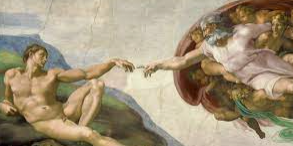
Creation of Adam
* gift of intellect
* brain shape behind God
* be what God created us to be (smart)
* brain shape behind God
* be what God created us to be (smart)
46
New cards
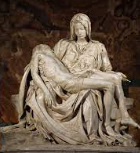
Pieta
* original was focused on Jesus, but after addition of a podium and a spotlight, the focus is on Mary
* Pieta meaning pity or compassion
* Mary is sorry for her son’s dead body
* Pieta meaning pity or compassion
* Mary is sorry for her son’s dead body
47
New cards
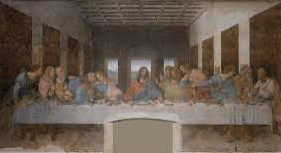
The Last Supper
* realistic
* depicts Jesus and His disciples at the Last Supper
* depicts Jesus and His disciples at the Last Supper
48
New cards
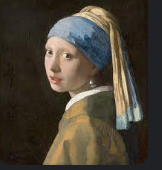
The Girl With a Pearl Earring
* individualism
* natural beauty
* pearl reflects wealth
* natural beauty
* pearl reflects wealth
49
New cards
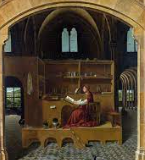
Unknown
* perspective
50
New cards
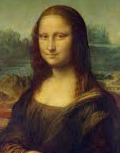
Mona Lisa
* individualism
* possible humanism/secularism (nature background)
* possible humanism/secularism (nature background)
51
New cards
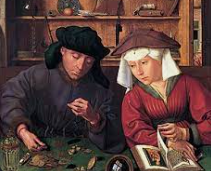
Husband and Wife
* reflection of renaissance art style changes from medieval
* woman reading
* shows real world changes from renaissance (book from printing press, scientific instruments in the back)
* woman reading
* shows real world changes from renaissance (book from printing press, scientific instruments in the back)